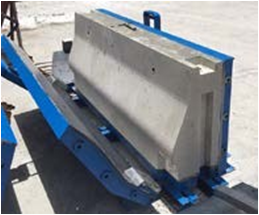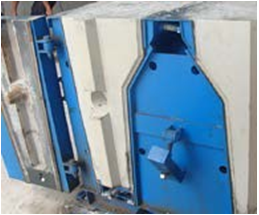Street light is a raised source of light on the edge of a road or path. Similar lights may be found on a railway platform. When urban electricpower. distribution became ubiquitous in developed countries in the 20th century, lights for urban streets followed, or sometimes led called also streetlamp.
There are two foundation types are common:
| Light Bases | Width | Length | Hight |
|---|---|---|---|
| Light Base A | 500 | 500 | 800 |
| Light Base B | 600 | 600 | 1000 |
| Light Base C | 700 | 700 | 1200 |
Where the street light column is installed into a hole in the ground and encased in concrete. Planted columns are very common. There are minimum depth requirements given in HA HD17/94 which are often used as design values. In many cases the minimum depth is not sufficient and the depth and diameter of the planted foundation must be calculated.
Where the street light column is bolted onto a concrete pad foundation which resists the forces by bearing onto the ground. Concrete pad foundations are sometimes used for larger street lights or where planted foundations would not be suitable.
A smooth concrete made of sand and no large rocks, typically used to make concrete with beautiful and Different shape as long as the planter isn›t huge, this will be the best concrete to choose as basins. And bumpers in architecture way in outdoor places.
Concrete chairs are used mainly in public facilities such as parks and crowded places frequently, and it is one of the practical solutions to eliminate the congestion problem, because it is stable, strong and durable for many years, and is not affected by climate change and won›t be damaged by rain in the winter because its composition is solid.
Can look great, especially once they have aged a little. While concrete is the practical choice for large plants that might need the ballast support against the wind because of its sheer weight, that weight also makes the planter difficult to move.
One of the main purposes of concrete fenders is to protect public installations from the danger of cars, There are many forms of strong concrete fenders produced by the ATTA BASES factory, and the barriers are distinguished by an architectural shape that expresses the customer›s desire.
| Bolar | Width | Hight |
|---|---|---|
| Bolar A | 450 | 600 |
| Bolar B | 540 | 720 |
Also known as wheel stops, parking chocks, curb stops and bumper blocks, the Century parking curbs / bumpers are designed to protect a large array of structures and other parked vehicles from being struck by vehicular traffic.
| Car Bumper | Width | Hight | Length |
|---|---|---|---|
| Car Bumper A | 200 | 150 | 1800 |
| Car Bumper B | 400 | 200 | 1800 |
| Car Bumper C | 300 | 200 | 1000 |
We have many types of Car Concrete stopper each type have different sizes depend on the parking size and vehicle type going to park The minimum size of a standard parking space shall be nine feet wide and eighteen feet long. Parking spaces within enclosed garages shall have an interior dimension of at least ten feet wide and twenty feet long. The minimum size of a compact parking space shall be eight feet wide and sixteen feet long.
Parking Lots: Most parking lots will need concrete pavement that is at least 6 inches deep.If heavyweight trucks will also be allowed, the thickness must be increased. The areas around dumpster pads and loading docks may need to be up to 12 inches thick.
A storm sewer is a pipe network that conveys surface drainage from a surface inlet or through. a manhole, to an outlet location.
There are many types of storm line such as:
A catch basin is an engineered drainage structure with the sole function of collecting rainwater and snowmelt from streets and parking lots and transporting it to local waterways through a system of underground piping, culverts, and / or drainage ditches. Catch basins can be found on public or private property.
Is an opening to a confined space such as a shaft, utility vault, or large vessel. Manholes are often used as an access point for an underground public utility, allowing inspection, maintenance, and system upgrades. The majority of underground services have manholes, including water, sewers, telephone, electricity, storm drains, district heating, and gas.
Is a rigid pipe that provides both structure and conduit when it arrives on site. Unlike flexible alternatives, concrete pipe has little dependence on the surrounding soil for its structural performance.
A reinforced concrete culvert of rectangular cross section These are used to dispose rain water.
| Culver Box | s | H | T | TB | TT |
|---|---|---|---|---|---|
| Culver Box A | 1500 | 1000 | 220 | 260 | 220 |
| Culver Box B | 2000 | 1500 | 240 | 280 | 240 |
| Culver Box C | 2500 | 2000 | 280 | 320 | 280 |
A Jersey barriers, Jersey wall, or Jersey bump is a modular concrete employed to separate lanes of traffic. It is designed to minimize vehicle damage in cases of incidental contact while still preventing vehicle crossovers resulting in a likely head-on collision. Jersey barrierss are also used to reroute traffic and protect pedestrians and workers during highway construction. They are named after the U.S. state of New Jersey which first started using the barriers as separators between lanes of a highway in the 1950s.
| New Jersey | Width 1 | Width 2 | Hight | Length |
|---|---|---|---|---|
| New Jersey A | 500 | 150 | 800 | 1000 |
| New Jersey B | 650 | 150 | 1000 | 1200 |
| New Jersey C | 500 | 200 | 1000 | 1500 |
Barriers are used on roadside construction projects when workers are present on a busy urban street or highway. This provides protection from traffic. Placing Jersey barrierss on a worksite can also help with the mitigation of pedestrian traffic around a construction site.
Precast concrete barriers are very useful in the management of pedestrians in commercial spaces. Placing road barriers will ensure that pedestrians will travel in the designated areas. Barriers can even be used as a permanent median for roads.
Businesses can also benefit from using concrete barriers as a protective perimeter around their building. Concrete barriers can also be utilized at local outdoor events to establish a zone for pedestrians, by demarcating the perimeter for security and to keep pedestrians contained.
This type of barriers protects the vehicle from accident, especially if they head opposite, it make the vehicle save to no depart from the lane if there is an acciedent or inattention of a bridge that also helps to reduce the sounds coming out of the cars.
We have many types of Highway Barrier and its depend on barrier location and each type have different sizes


This type of barriers should be installed at edge of road to protect the vehicle to stay at highway line and its sweetable for bridge.
This type of barriers should be installed in the center betweem two highway line and its work as separation between the lines to protect the vehicle it self.
This type of barriers should be installed at the end or starting of Edge and Center barriers.